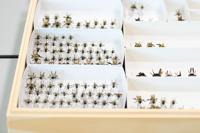Students work on their summer research project with native bees on campus 2022.
MADISON (WKOW) — A Madison native is working to make her college campus more hospitable for a popular pollinator.
Two students at Luther College in Iowa have identified seven types of bees that haven’t been recorded in the state before.
Emmelyn Cullen is working to prove the huge impact of native plants through a small tool, a bee.
“We’ve only identified 55 so far, species,” Cullen said. “But we have quite a few specimen that we’ve collected that we haven’t gone through yet.”
Cullen and research partner Gwen Coleman are headed into their junior year at Luther College. They spent their summer analyzing bee diversity on campus. So far, they say they’ve found seven types of bees that have never been recorded in Iowa.
“A lot of the ones that we’ve discussed have been found in Wisconsin or Minnesota, or even in other surrounding states. It’s just that we haven’t found them in Iowa yet,” Coleman said. “We’re hoping that this will be like a baseline for future studies that they’re able to use.”
“Anytime these new discoveries lead to a more robust sense of what’s there it’s good, because people care about those species,” Dan Young, entomology professor at UW Madison and the director of the Wisconsin Insect Research Collection, said.
Some of his work focuses on bees.
“Far as it goes, a lot of people don’t know how much bees do impact them,” Young said.
Young says about a third of the food we eat wouldn’t be possible without pollinators like bees. Without pollination by insects our lives could look very different.
“All you end up with is crops that are pollinated by wind,” Young said. “And you don’t end up with a very diverse table you end up with some cereal crops and some bad beer.”
“So the end goal for this project is to be able to make recommendations to our college land use council, when it comes to having more native plants on campus in the landscaping and in flower beds,” Cullen said.
Cullen, Coleman and Young all say the best way to protect these pollinators is by preserving their natural habitat, like plants that are native to the region.
“By planting these native plants we’re really helping the native bees,” Coleman said. “And then by supporting the native bee population, we’re helping the native plant population.”
They say if native plants and habitats aren’t taken care of for pollinators, the way the ecosystem works would start to fall apart. Young compares a community ecosystem to an intricate tapestry.
Each pollinator is like a thread.
“How many threads can you pull apart,” Young asked. “How many of those threads can you pull away before the whole thing collapses? Or becomes something that was unrecognizable, and really not what it was created to be?”
Cullen and Coleman both hope that other schools will start a project like Luther’s to bolster their local plants and pollinators.
